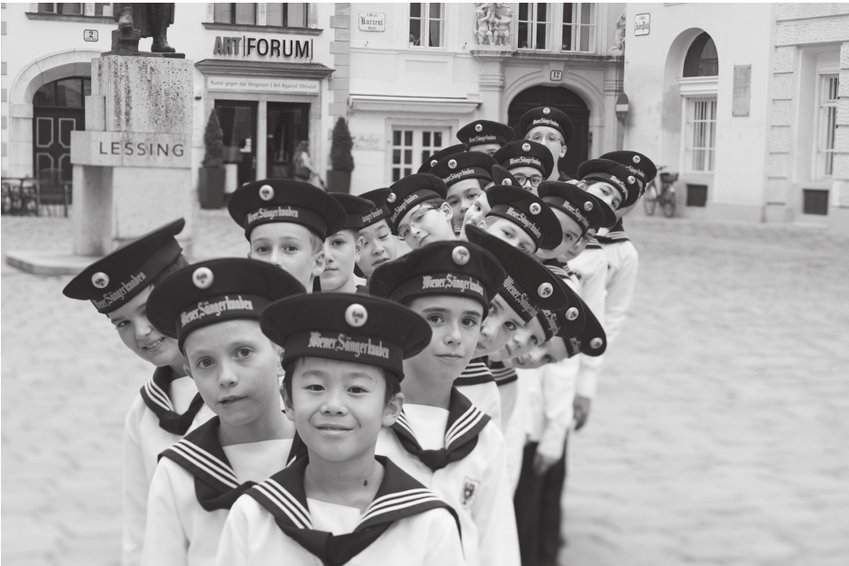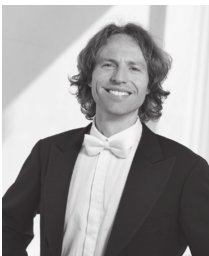
Christmas in Vienna sounds like a staid affair, but when I caught up with the Vienna Boys Choir last week, they were tearing a boisterous swath across the United States with their ebullient, dancing choirmaster from Italy, Manolo Cagnin.
“Today we’re going to play laser tag and go bowling,” Cagnin said. “We have an electric piano on the bus and we’ll use it to try out ideas.”
The choir’s angelic aura will precede it to MSU’S Wharton Center Tuesday, but Cagnin is eager to bring the venerable organization down to Earth.
“We sing with a lot of passion and a lot of heart and a lot of body language, like in Italy,” he said. “It’s 25 normal, good boys, not so extremely wonderful, but we work every day, we rehearse.”
The touring and rehearsing time Cagnin and his charges spend together creates a rapport most maestros would envy.
“I understand in one second when something’s wrong,” Cagnin said. “They know what I’m going to say, from my face, my hair, my body. You can have that only when you know each other deeply.”
Watching Cagnin’s constantly flying, almost prehensile head of hair, you believe that it signals his moods to the kids.
“My job isn’t just to play the piano and to conduct,” he said. “We deal with life.”
Laser tag and electric pianos were not around when the choir was founded in 1498, when Holy Roman Emperor Maximilian I moved his court and its musicians to Vienna and started the choir.
Franz Joseph Haydn sang with them.
Mozart and Bruckner worked with them.
The list of alumni is mind-boggling, but the weight of tradition sits lightly on their shoulders.
“I don’t need the boys to scream like it’s a Wagner opera,” Cagnin said. “I like it light and mild and bright, and it’s got to be fun.”
One of the choir’s current crowd-pleasers is a rousing polka about a man who takes a mountainside vacation.
“Everything goes wrong. It starts raining, the heat is unbearable, things are breaking,” Cagnin said. He tells the kids to think of Mr. Bean, the hapless BBC-TV bumbler played by Rowan Atkinson.
“I’m not a music teacher,” he said. “A ten-year-old kid doesn’t care about B major or what the dominant chord is. We talk about what the composer means and how to communicate it.”
Another tune, “Mambo Italiano,” calls for a half-shouted, half-sung “hey.” “Everybody plays soccer,” he tells the boys. “You make a goal, yell ‘Aaaay.’” To rehearse a song driven by an Italian dance rhythm called a tarantella, Cagnin danced in front of them, to imitate the gyrations caused by the bite of a tarantula (according to legend).
“They need to move their body, not just sing with the brain,” he said.
Cagnin takes the choir on tours all over the world, from Singapore to Vietnam to New Zealand, carving out an empire of sound that would have astonished Maximilian. They still sing for Sunday Mass in Vienna’s Imperial Chapel, as they have for 500 years.
The appeal of “normal boys” making extraordinary music has only grown over the war-torn centuries.
When the Habsburg Empire fell after 1918, the choir thrived as a private institution, under the name of Vienna Sängerknaben. The boys switched their imperial outfits to sailor suits, the big thing for kids back then. Since 1926, they’ve gone on 1,000 tours in 100 countries, adding a lot of secular tunes and world music to their growing repertoire.
It’s now a well-oiled troupe of 100 boys aged ten to fourteen, from dozens of countries, divided into four touring groups.
“Every day we are on the bus for hours,” Cagnin said. “It’s not, ‘OK, silence, nobody speaks now. Sleep, eat and sing.’ That’s not human. They are developing their personality. We have to support them.”
Part of his job is to deal with the boys’ personal problems.
“All kinds of things come up every day,” he said. “‘My glasses are broken, I’m falling in love with this girl and what should I do?’” He ran through his answer suspiciously fast: “It’s OK, when I was 14, I did ba-ba-ba-ba.”
It’s not the life Cagnin planned for.
After studying violin and viola in his hometown of Venice, he moved to Milan, where he started conducting and composing.
In Liepzig, Germany, he worked with a boys’ choir that goes back so far it makes the Vienna Boys Choir look like upstarts: the St. Thomas Choir in Liepzig, founded in 1212. Johann Sebastian Bach himself directed the choir in the mid-1700s.
A good friend, also named Manolo, was a choirmaster at the Vienna Boys Choir and suggested Cagnin look into it.
But Cagnin’s dream was to conduct operas and symphonies, not boys’ choirs.
“I was not so sure about it at the beginning — working every day with children, spending most of the time on the road,” Cagnin said. “Then I thought, ‘Why not? I’ll try it for a couple of years. Ten years later, I’m still here.”
He discovered that he could do things in Vienna he couldn’t have done in a conventional career.
“I can’t understand, with the modern conductor — one day in New York, one day somewhere else, ‘Give me a crescendo, give me a diminuendo,’” he said. “Music is life. I can’t work for two hours and make music that comes from the soul.”
The freshening element at the choir comes from the group’s rapid turnover.
“Every year, it’s something new — new children, a new feeling, a new atmosphere. It’s like a wonderful drug. You can’t say ‘stop.’ Every day is a new wonderful day and probably I will die in Vienna.”
Vienna Boys Choir: Christmas in Vienna
7:30 p.m. Tues, Nov. 28 Wharton Center Cobb Great Hall $15.50-55.50 1-800-Wharton
Support City Pulse - Donate Today!
Comments
No comments on this item Please log in to comment by clicking here